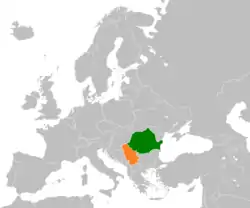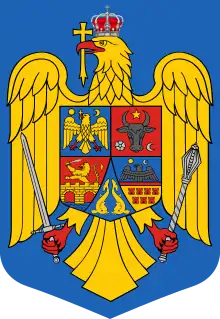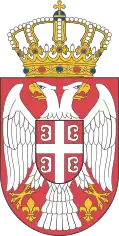Romania–Serbia relations
Romania–Serbia relations are foreign relations between Romania and Serbia. Both countries established diplomatic relations on April 19, 1841. As of 2023, relations are very close and a mutual friendship sentiment is present in both countries.
 | |
Romania |
Serbia |
|---|---|
History
Although Serbia unofficially opened a kind of diplomatic agency in Bucharest in March 1836,[1] officially, the first Serbian diplomatic agency in Bucharest was established in February 1863, with Kosta Magazinović, as its first diplomatic agent. Reciprocally the first Romanian diplomatic agency in Belgrade was established on 12/24 March 1863 and the first diplomatic agent was Teodor Calimachi.[2]
In 1879, as a consequence of the independent state status, the diplomatic agencies from Belgrade and Bucharest became legations and the diplomatic agents, resident ministers. Thus on 14/26 April 1879 the Romanian diplomatic agency in Belgrade became legation, having Lascăr Catargiu as its first resident minister.[3] In the summer of 1879 Milan A. Petronijević became Serbia's first resident minister in Romania.[4] Later, after Romania and Serbia became kingdoms, in 1881 and 1882, their diplomatic representatives became "extraordinary envoy and plenipotentiary ministers". It was only in 1939 when the legations from Belgrade and Bucharest became embassies.
However, a gradual cut-off of international relations between Romania and Serbia (in that time Yugoslavia) happened in May 1941, after Romania recognized the independence of the German-controlled Independent State of Croatia, due to Romania being an Axis power at the time.
Modern relations
Modern relations between Romania and Serbia began right after the Romanian Revolution and the beginning of the Yugoslav Wars. In the last decade of the 20th century, relations between the two countries were mostly affected after Romania decided to join the international community and enforced the embargo UN imposed over Yugoslavia during the Bosnian War, leading to a political rupture of the good historical relations between the two countries.
This, inadvertently, led to one of the biggest illegal trafficking network in Europe at the time. As the embargo prevented Yugoslavia from purchasing fuel, Romanian citizens, impoverished by the internal crisis inadvertely caused by the fall of the communist regime, began illegaly crossing the Danube in order to sell petrol, diesel and other forms of fuel to their Serbian neighbours. During a two years period, between 1993 and 1995, a lot of Romanians in the villages on the Danube shore got rich by illegal means, helping their Serbian counterparts. Any form of gas in Yugoslavia was around five times more expensive than in Romania. The network abruptly shut down in 1995, and it is believed that, despite their position, the Romanian government involved in it. Around ten to twenty people were killed during those years, either by the Romanian border guards or other smugglers.[5]
Politic relations got even worse during the late years of the same decade, when Romania, on its way of accession to NATO, allowed NATO planes to use Romanian airspace in order to strike targets in Serbia. Supporting NATO during the Yugoslav Wars got Romania's position as an official NATO member in 2004. However, civilians continued showing support to Serbia, most Romanian citizens not agreeing with their government position.[6]
After the end of the Yugoslav Wars, relations gradually improved, with Romania supporting Serbia's integration with the international community. Nowadays, symbolizing the good relations between Romania and Serbia, there is in the former a sentence that says "Romania only has two friends: the Black Sea and Serbia". However, this phrase and the state of the relations between both has been disturbed by the Romanians in the Timok Valley in Serbia, where they are known in Serbian as "Vlachs", claiming a separate ethnic identity from the Romanians.[7] [8]
Romania-Kosovo relations
Relations between Romania and the Republic of Kosovo are inexistent as of 2023. Kosovo's declaration of independence from Serbia caused debates and outrage in Romania, as the country strongly opposes Kosovo's independence. Romania is among the five countries part of the European Union who does not recognize Kosovo, and one of the seven countries boycotting Kosovo's admission to the Council of Europe in 2023.
The main reason for this is the Székely Land problem that Romania faces: it is considered that, if Romania would recognize Kosovo's independence, Székely Land, with a majority of ethnic Hungarians and Székelys, would seek to obtain its autonomy or independence, with some public nationalist individuals such as Corneliu Vadim Tudor claiming that Székely Land would instantly follow joining neighbouring Hungary, country that used to control the area for hundreds of years.[9]
A vote was held on 18 February 2008 in the Parliament of Romania, the very next day after Kosovo declared its independence from Serbia, to determine if Romania shall recognize Kosovo as an independent country, but the results were divided by a landslide for voting against, with 357 votes for ”No” and only 27 votes for ”Yes”, mostly coming from the ethnic-Hungarian party UDMR (Hungary recognized Kosovo's independence on March 19 of the same year). Furthermore, both the president Traian Băsescu and prime-minister Călin Popescu-Tăriceanu opposed.[10][11]
A possible change was shown during the leadership of Victor Ponta, who stated that ”Romania must follow EU's lead" after the European Union urged Cyprus, Greece, Romania, Slovakia and Spain to reconsider their decisions regarding Kosovo. However, after his resign in 2015, no such thing was considered by the Government of Romania.[12]
Romania mantains a liaison office in Pristina, but not an official embassy.
Romania-Kosovo football match in 2023
Relations between Romania and Kosovo got even worse after a football match between the two national football teams in 2023. Despite not having relations and Romania not recognizing Kosovo as a sovereign state, the two national teams were drawn in the same group for the qualifiers to the UEFA Euro 2024 tournament.
During the second leg match between the teams taking place on Arena Națională in Bucharest, an extremist fan faction of the Romanian side, named ”Uniți Sub Tricolor” (”United Under Tricolour” in Romanian) displayed two banners quoting ”Basarabia e România” (”Bessarabia is Romania” in Romanian) and ”Kosovo je Srbija” (”Kosovo is Serbia” in Serbian) and began shouting pro-Serbia chants. Moreover, in the 19th minute, a fan threw a torch on the pitch, causing the Kosovar side to leave the pitch in protest, with the match getting interrupted.[13]
The Romanian ”Jandarmerie” unit forcefully removed the banners, but not also the hooligans. Despite being called back on the pitch, the Kosovar players still refused to come back on the pitch, disrupting the match even more. The match was eventually relaunched 50 minutes later and Romania won 2-0.
After the match, the Football Federation of Kosovo filled a report against the Romanian Football Federation to UEFA, demanding that Kosovo should be awarded a 3-0 victory because of the events. The complain was denied but the Romanian Football Federation was given a 52,000 Euros fine and was ordered to play the next home match in the group (against Andorra) without fans.[14] [15]
Embassies
.jpg.webp)
Romania has an embassy in Belgrade and a consulate-general in Vršac. Serbia has an embassy in Bucharest and a consulate-general in Timișoara.
Memberships
Both Romania and Serbia are members of the:
- South-East European Cooperation Process Stability Pact for South Eastern Europe
- Central European Initiative
- Southeast European Cooperative Initiative
- Organization of the Black Sea Economic Cooperation
Romania's position in Serbia's accession to the European Union
Serbia borders four European Union member states while not being itself a member state. Out of 1343.4 kilometers of border, 546.4 are of shared border with Romania, which is considered to be one of Serbia's key allies in its European Union integration path.[17]
Serbia officially applied for European Union membership on December 22, 2009, and has become an official candidate on March 1, 2012. Before this, Romania unsuccessfully tried to veto Serbia on receiving the candidate status, quoting the lack of minority rights for the Romanian minority in Serbia. However, ever since then, Romania intensively intervened in Serbia's accession by sending aid in forms of financiar and technical means to their Serbian counterparts.[18]
Romania has not recognized Kosovo's independence from Serbia despite European Union's general support for Kosovo's autodetermination. In order for Serbia to become a European Union member state, it is considered that it should recognize Kosovo's legitimacy, thing that was completely unnacceptable for any Serbian government ever since Kosovo's declaration of independence or since Serbia applied for European Union membership. Kosovo itself tries to become an European Union member state but opposition from some European Union member states, as well as its disputed status, is making this very hard.
Both Serbia and Romania are firm with their positions regarding Kosovo, thus making Serbia's accession to the European Union a harder mission. The 35th chapter of the negociations between Serbia and the European Union regard the relations with Kosovo, and while some progress has been made, neither Belgrade's or Pristina's positions are clear.
However, despite any of those reasons, with the progress that has been made, Serbia is widely believed to be the next country to join the European Union (maybe in the same time as Montenegro), somewhere between 2025 and 2030 (between 12 and 17 years since the last country, Croatia, joined the European Union).
Serbs of Romania
The Serbs of Romania are a recognized ethnic minority. According to the 2011 census, there were 18,076 Serbs in Romania (~0.1%). Serbs mostly live in western Romania, in the Romanian part of the Banat region, where they constitute an absolute majority in two communes and a relative majority in one other.
Romanians of Serbia
The Romanians of Serbia are a recognized ethnic minority. According to the 2022 census, there were 23,044 Romanians in Serbia (~0.3%), while 21,013 people declared themselves "Vlachs". There are differing views among some of the "Vlachs" over whether or not they should be regarded as Romanians or as members of a distinctive nationality. Romanians and "Vlachs" mostly live in northeastern Serbia, in the Timok Valley and in the Serbian part of the Banat region to be exact, where they constitute a minority in two municipalities and in Vojvodina. Romanians of the Timok Valley have no schools where to practice their maternal language.
See also
References
- Reprezentanțele diplomatice ale României, vol. I, 1859–1917, București, 1967, pp. 130–134.
- G.G. Florescu, "Agențiile diplomatice de la București și Belgrad (1863–1866)", în Romanoslavica XI/1965, pp. 126–131.
- A. A. Căpușan, Diplomați români de elită, vol. II, ediția a II-a, București, 2009, p. 13.
- Bogdan Catana, Relații diplomatice româno-sârbe, 1880–1913, Craiova, 2009, p. 74.
- Digi 24 (in Romanian). 23 August 2015 https://www.digi24.ro/special/reportaje/reportaj/embargoul-sarbilor-paradis-pentru-romani-in-perioada-1992-1995-430474.
{{cite news}}: Missing or empty|title=(help) - Newsweek (in Romanian). 9 April 2021 https://newsweek.ro/istorie/calendar-9-22-aprilie-avioanele-nato-bombardeaza-serbia-venind-din-romania.
{{cite news}}: Missing or empty|title=(help) - Bărbulescu, Ovidiu (31 May 2015). "Premierul sârb, întrevedere cu Victor Ponta: România are Serbia și Marea Neagră drept prieteni. Serbia nu are mare, o are doar pe România". Mediafax (in Romanian).
- Cupcea, Radu (22 June 2021). "Ferește-mă, Doamne, de prieteni! Dezinformarea anti-românească capătă proporții naționale în Serbia". Adevărul (in Romanian).
- Damian, Alexandru; Demjaha, Agon (11 June 2019). "The Kosovo Question in Romanian politics". blog.politics.ox.ac.uk/.
- President Basescu says Romania not to recognise Kosovo independence, HotNews.ro, 2008-02-19
- Romania will not recognise Kosovo independence, Reuters, 2008-02-19
- "Romania 'could recognize Kosovo' – PM". B92. 27 May 2015. Retrieved 27 May 2015.
- "Romania beats Kosovo 2-0 in temporarily suspended match due to fans' 'discriminatory behavior'". CNN. 14 September 2023.
- "Kosovo anunță că merge la UEFA și TAS, după scandările din meciul cu România". Digi Sport (in Romanian). 14 September 2023.
- "Câţi bani a pierdut FRF din cauza ultraşilor! Amenzi uriaşe de la UEFA". Fanatik (in Romanian). 20 September 2023.
- Ghigeanu, Mădălin (2022). Curentul Mediteraneean în arhitectura interbelică. Vremea. p. 69. ISBN 978-606-081-135-0.
- "Romania backs Serbia's EU integration process: president". Xinhua. 28 June 2022.
- "Romania accused of 'lack of European spirit' over Serbia's candidacy". Euractiv. 29 February 2012.
Further reading
- Isailović, Neven G.; Krstić, Aleksandar R. (2015). "Serbian Language and Cyrillic Script as a Means of Diplomatic Literacy in South Eastern Europe in 15th and 16th Centuries". Literacy Experiences concerning Medieval and Early Modern Transylvania. Cluj-Napoca: George Bariţiu Institute of History. pp. 185–195.
- Ivić, Pavle, ed. (1995). The History of Serbian Culture. Edgware: Porthill Publishers. ISBN 9781870732314.
- Mitrović, Andrej (1969). Jugoslavija na Konferenciji mira 1919-1920. Beograd: Zavod za izdavanje udžbenika.
- Mitrović, Andrej (1975). Razgraničenje Jugoslavije sa Mađarskom i Rumunijom 1919-1920: Prilog proučavanju jugoslovenske politike na Konferenciji mira u Parizu. Novi Sad: Institut za izučavanje istorije Vojvodine.
- Pilat, Liviu (2010). "Mitropolitul Maxim Brancovici, Bogdan al III-lea şi legăturile Moldovei cu Biserica sârbă". Analele Putnei (in Romanian). 6 (1): 229–238.
- Sorescu-Marinković, Annemarie (2010). "Serbian Language Acquisition in Communist Romania" (PDF). Balcanica (41): 7–31. doi:10.2298/BALC1041007S.
- Stojkovski, Boris; Ivanić, Ivana; Spăriosu, Laura (2018). "Serbian-Romanian Relations in the Middle Ages until the Ottoman Conquest" (PDF). Transylvanian Review. 27 (2): 217–229.
External links
- Serbian Ministry of Foreign Affairs about relations with Romania
- Serbian embassy in Bucharest
- Serbian general consulate in Timișoara (in Romanian and Serbian only)
- Romanian-Serbian Relations (late 19th century – early 20th century)
- General Consulate of Romania in Vršac (in Romanian)

